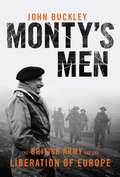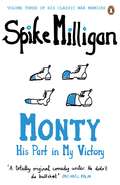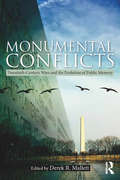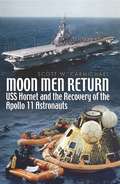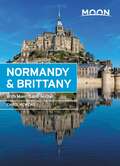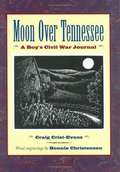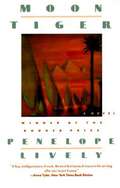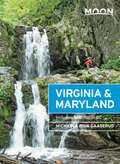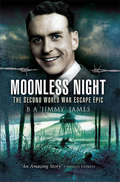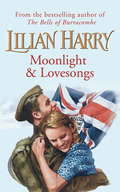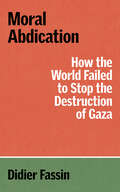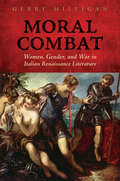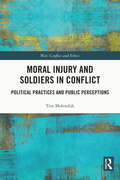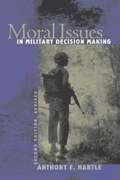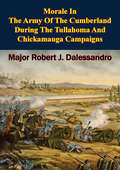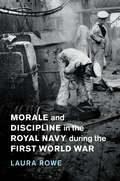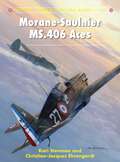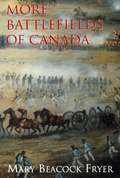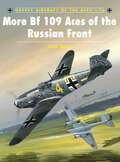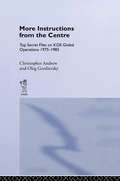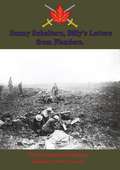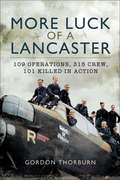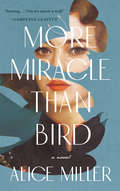- Table View
- List View
Monty's Men
by John BuckleyHistorian John Buckley offers a radical reappraisal of Great Britain's fighting forces during World War Two, challenging the common belief that the British Army was no match for the forces of Hitler's Germany. Following Britain's military commanders and troops across the battlefields of Europe, from D-Day to VE-Day, from the Normandy beaches to Arnhem and the Rhine, and, ultimately, to the Baltic, Buckley's provocative history demonstrates that the British Army was more than a match for the vaunted Nazi war machine. This fascinating revisionist study of the campaign to liberate Northern Europe in the war's final years features a large cast of colorful unknowns and grand historical personages alike, including Field Marshal Sir Bernard Montgomery and the prime minister, Sir Winston Churchill. By integrating detailed military history with personal accounts, it evokes the vivid reality of men at war while putting long-held misconceptions finally to rest.
Monty: His Part in My Victory (Spike Milligan War Memoirs)
by Spike MilliganVOLUME THREE OF SPIKE MILLIGAN'S LEGENDARY MEMOIRS IS A HILARIOUS, SUBVERSIVE FIRST-HAND ACCOUNT OF WW2'The most irreverent, hilarious book about the war that I have ever read' Sunday Express 'Brilliant verbal pyrotechnics, throwaway lines and marvelous anecdotes' Daily Mail ______________ 'It's all over, Von Arnheim has surrendered and he's very angry.' 'This could mean war . . .' The third volume of Spike Milligan's laugh-a-line account of life as a gunner in World War Two resumes on the eve of victory in North Africa. Now Britain's looniest war hero must combat some of the direst threats a soldier has ever faced - boredom ('Christ, I just thought of Catford'), moving camp ('It's a sort of Brighton with camels'), moving camp again ('We're already somewhere else'), a visit to Carthage ('It's terrible, it's like Catford') and a perilous encounter with the gloriously endowed Mademoiselle Villion ('"Help! massage," I said weakly').Against the odds, they survive and are sent at last to Italy to be killed...______________ 'That absolutely glorious way of looking at things differently. A great man' Stephen Fry 'The Godfather of Alternative Comedy' Eddie Izzard 'Manifestly a genius, a comic surrealist genius and had no equal' Terry Wogan 'A totally original comedy writer' Michael Palin 'Close in stature to Lewis Carroll and Edward Lear in his command of the profound art of nonsense' Guardian
Monumental Conflicts: Twentieth-Century Wars and the Evolution of Public Memory
by Derek R. MallettMonumental Conflicts examines 20th century wars from the First World War to the First Gulf War, each chapter analyzing how public memory has evolved over time. The chapters raise fascinating questions about war and memory: Why are wars remembered as they are? What factors drive changes in public perception? What implications arise from remembering and commemorating a war or particular aspects of a war? What does public memory of a war say about us as a society? The volume is divided into three sections focusing on political evolution, negotiated memories of war, and national pride and covers international wars from Afghanistan to Vietnam and German deserter monuments to Vietnamese war tourism.
Moon Japan: Plan Your Trip, Avoid the Crowds, and Experience the Real Japan (Travel Guide)
by Jonathan DeHartFrom the world's busiest intersection to the most serene hot springs, modernity and tradition mingle in Japan. Experience the natural wonder and rich culture of a country unlike any other with Moon Japan. Inside you'll find:Flexible itineraries including a two week 'Best of Japan' and a week in and around TokyoStrategic advice for spiritual seekers, anime fans, foodies, fashionistas, hikers, and moreThe top sights and unique experiences: Wander the shrines and temples of Ueno-koen park and stop in Tokyo National Museum for world-renowned Japanese art. Learn about samurai heritage in Sanmachi Suji or zazen meditation at the Buddhist temples of Kyoto, and get an unforgettable lesson in 20th century history at Hiroshima Peace Memorial Park Outdoor adventures: Hike the trails of Mt. Fuji or the river-filled valley of Kamikochi and relax in a communal onsen hot spring. Ski or snowboard at a world-class resort, surf in the Pacific off the coast of Shikoku, or dive along the coral reefs of OkinawaThe best local flavors: Feast on ramen or an elaborate spread of sushi, sample fresh seafood at the world's largest fish market in Tokyo, and drink your way through the famed beer scene in SapporoHonest insight from American expat and longtime Tokyo local Jonathan DeHartFull-color, vibrant photos throughoutDetailed maps and useful tips for navigating public transportation Focused coverage of Tokyo, Mt. Fuji, Kanazawa, Kyoto, Kansai, Hiroshima and Miyajima, Okinawa, Tohoku and Hokkaido, Shikoku and Kyushu, and moreThorough background information on the landscape, wildlife, history, government, and cultureHandy tools including health and safety tips, customs and conduct, and information for LGBTQ, female, and senior travelers, as well as families and travelers with disabilitiesWith Moon's practical advice and insider tips, you can experience the best of Japan.Exploring more of Asia? Check out Moon Vietnam.
Moon Men Return
by Scott CarmichaelThe splashdown and recovery of Apollo 11 on 24 July 1969 was a historic event, which fulfilled President John F. Kennedy s national goal of placing a man on the moon and returning him safely to earth by the end of the 1960s. This book tells the dramatic story of the USS Hornet s recovery of the astronauts after the splashdown of their command module. This detailed account draws not only on historical records but also on the memories of eighty men who served aboard the Hornet and participated in the recovery operation, including Navy UDT frogman John M. Wolfram, who was the first to reach the Apollo II astronauts. Their inside account offers deck-level perspectives of events and includes details never before documented for the public. Their stories reveal that although the recovery operation looked easy and uneventful, there were many problems to overcome. For example, a machinist s mate had to repair a broken propeller shaft while the ship was underway so the Hornet could reach the point of splashdown on time; storms forced the ship to navigate by dead reckoning placing it miles away from its destination just minutes before Apollo came down; and a HS-4 helicopter narrowly avoided colliding with the command module due to heavy cloud cover. Yet, according to the author, the VIPs on the Hornet never suspected anything amiss. In addition to these behind-the-scenes stories, the book includes a never before published photograph of the Apollo 11 command module as it splashed down in the Pacific Ocean. Previously known only to those associated with the Navy SEAL who took the photo, the author established its authenticity through interviews with those on the helicopter and those who processed the photograph on the Hornet. Other photographs not previously released to the public, including surface-level photos taken by UDT swimmers during the recovery procedure are also among the illustrations displayed in the book.
Moon Normandy & Brittany: With Mont-Saint-Michel (Travel Guide)
by Chris NewensDramatic coastline, charming villages, unforgettable history, and distinct local culture: See a different side of France with Moon Normandy & Brittany. Inside you&’ll find:Flexible itineraries for 1 to 5 days in Normandy and Brittany that can be combined into a 2-week trip, plus suggestions for easy side tripsStrategic advice for foodies, art lovers, history buffs, outdoor adventurers, and more Must-see highlights and unique experiences: Hike the dramatic chalk cliffs of Étretat or stroll the gardens that inspired Monet's Water Lilies. Cycle the rolling hills and endless backroads to small villages and sip cider with locals at a Celtic Festoù-noz pulsing with traditional dance and music. Pay your respects at the D-Day beaches and monuments and learn about the largest military landing in history. Admire the spectacular monastery rising above the tidal plains of Mont Saint Michel and enjoy fresh seafood in Saint-Malo Honest advice on where to stay, how to get around, and where to find the best regional cuisine, from creamy cheeses in Normandy to Breton galettes and cider Local perspective from British expat and local expert Chris Newens Full-color photos and detailed maps throughoutHelpful resources on COVID-19 and traveling to Normandy and Brittany Background information on the landscape, history, and cultural customs of each region Handy tools such as a French phrasebook and tips for traveling with children or as a senior Experience the best of Normandy and Brittany with Moon. Exploring more of France? Try Moon Provence or Moon French Riviera. About Moon Travel Guides: Moon was founded in 1973 to empower independent, active, and conscious travel. We prioritize local businesses, outdoor recreation, and traveling strategically and sustainably. Moon Travel Guides are written by local, expert authors with great stories to tell—and they can't wait to share their favorite places with you. For more inspiration, follow @moonguides on social media.
Moon Over Tennessee: A Boy's Civil War Journal
by Craig Crist-EvansA thirteen-year-old boy sets off with his father from their farm in Tennessee to join the Confederate forces on their way to fight at Gettysburg. Told in the form of diary entries. Historical fiction.
Moon Tiger
by Penelope LivelyThe last thoughts of a dying writer are captured in this intelligent novel. The moving and poignant story of life as a writer, historian, and mother ends as a saga of unfulfilled love.<P><P> Man Booker Prize winner
Moon Virginia & Maryland: Including Washington DC (Travel Guide)
by Michaela Riva GaaserudFrom museums and monuments to sleepy mountain towns and beaches, history comes to life with Moon Virginia & Maryland. Inside you'll find: Strategic, flexible itineraries, including a two-week tour of the best of both states and a week on the eastern shore, with ideas for road-trippers, history buffs, claw-cracking crab lovers, and moreCan't miss experiences and unique activities: Peep the changing leaves on Skyline Drive, raft down the Shenandoah River, hike a segment of the Appalachian Trail, or relax on the beach of the quaint (and car-free!) Tangier Island. Wander through world-class museums and marvel at the impressive monuments in Washington DC. Feast on oysters and beer in a historic tavern, hit the trendy eateries in Baltimore, or kick back at a crab shack for a taste of Maryland's famous blue crabWays to immerse yourself in history: Step back in time at Revolutionary and Civil War battlefields, experience colonial life in Williamsburg, or tour the homes of former presidents like Jefferson and WashingtonLocal insight from native Virginian Michaela Riva Gaaserud on when to go, where to stay, and how to get aroundFull-color, vibrant photos and detailed maps throughoutThorough background on the landscape, wildlife, climate, and local culture, plus advice for families, seniors, and international visitorsWith Moon Virginia and Maryland's practical tips and local know-how, you can experience the best of these two remarkable states.Hitting the road? Try Moon Drive & Hike Appalachian Trail. Staying in the city? Check out Moon Washington DC.
Moon Virginia: With Washington DC (Travel Guide)
by Michaela Riva GaaserudFrom metropolitan cities and misty mountains to colorful coastline and charming small towns, journey through the Old Dominion state with Moon Virginia. Inside you'll find:Flexible itineraries, such as five days visiting Virginia's battlefields and breweries and ten days exploring the whole state, with detailed coverage of Washington DCThe best road trips in Virginia, including the scenic Skyline Drive and the Blue Ridge ParkwayStrategic advice for history buffs, foodies, outdoor adventurers, families, and moreCan't-miss sights and unique experiences: Visit Revolutionary War battlefields and hear the stories behind Civil War landmarks or immerse yourself in history in Colonial Williamsburg. Stroll the Virginia Beach boardwalk or ride the coasters at Busch Gardens. See world-class museums and monuments in the nation's capital, pop into indie boutiques in Richmond, or visit the homes of former presidents like Jefferson and Washington. Hike sections of the Appalachian Trail, explore underground caves, or kayak on the Potomac River. Sample authentic Virginia ham, kick back at a local brewery, and discover the best spots for a romantic getawayExpert advice from Virginia local Michaela Riva Gaaserud on when to go, what to pack, and where to stay, from campgrounds to historic innsThorough background on the culture, weather, wildlife, and historyWith Moon's practical tips and local know-how, you can experience the best of Virginia.Headed to the Smokies? Check out Moon Great Smoky Mountains National Park. Exploring more of the South? Try Moon North Carolina or Moon Charleston & Savannah.
Moonless Night: The Second World War Escape Epic
by B A James“James is the sort of person they write legends about. A participant in the mass escape that was the basis for the movie The Great Escape.” —AudioFileFrom the moment he was shot down to the final whistle, Jimmy James’ one aim as a POW of the Germans was to escape. Moonless Night describes his experiences and those of his fellow prisoners in the most gripping and thrilling manner. The author made more than twelve escape attempts including his participation in The Great Escape, where fifty of the seventy-six escapees were executed in cold blood on Hitler’s orders.On re-capture, James was sent to the infamous Sachsenhausen Concentration Camp where, undeterred, he tunneled out. That was not the end of his remarkable story.Moonless Night has strong claim to be the finest escape story of the Second World War.“An amazing story.” —The Sunday Express
Moonlight & Lovesongs
by Lilian HarryA warm and poignant story set against the backdrop of a great English seaport at war from the Sunday Timesbestselling author.As the Second World War enters its final year, the spirit of the close-knit community in April Grove, Portsmouth refuses to die. Teenager Carol Glaister, forced to give up her baby son, becomes increasingly obsessed by the need to find him again. Ambitious, sexy Diane Shaw leaves the aviation factory for a career in the WAAFs but discovers she is up against far more than she bargained for - in both work and love. And Olive Harker struggles to stay true to a husband she has barely seen since the war began, her love challenged in a way she would never have dreamed possible.
Moral Abdication: How the World Failed to Stop the Destruction of Gaza
by Didier FassinWestern governments and elites have supported the destruction of Gaza, silencing the Palestinians and those who speak on their behalf.Providing a record of the first six months of the war waged by the Israeli army after the 7 October attacks and drawing on a rich range of international sources, Didier Fassin examines how most Western governments have acquiesced in and often contributed to the destruction, by the Israeli army, of Gaza, its homes, infrastructures, hospitals, institutions of education, and civilian population. To justify their support and prevent criticism, they have provided an official version of the events, adopting the Israeli narrative. It was largely taken up by mainstream media, which ignored the experiences and perspectives of Palestinians. Dissenting voices were silenced. A policing of language and thought was imposed. Censorship and self-censorship became normalized. To call for a ceasefire or to demand the respect of humanitarian law was enough to prompt the ever-ready accusation of antisemitism. Exploring the multiple dimensions of the extreme inequality of lives between the two sides of the conflict and analyzing the complex geopolitical, economic and ideological stakes that underlie it, Fassin intends to constitute an archive of this moral abdication. In his view, the abandonment of the values and principles proclaimed by Western elites to be foundational will leave a deep scar in the history of the world.
Moral Combat: Women, Gender, and War in Italian Renaissance Literature (Toronto Italian Studies)
by Gerry MilliganThe Italian sixteenth century offers the first sustained discussion of women’s militarism since antiquity. Across a variety of genres, male and female writers raised questions about women’s right and ability to fight in combat. Treatise literature engaged scientific, religious, and cultural discourses about women’s virtues, while epic poetry and biographical literature famously featured examples of women as soldiers, commanders, observers, and victims of war. Moral Combat asks how and why women’s militarism became one of the central discourses of this age. Gerry Milligan discusses the armed heroines of biography and epic within the context of contemporary debates over women’s combat abilities and men’s martial obligations. Women are frequently described as fighting because men have failed their masculine duty. A woman’s prowess at arms was asserted to be a cultural symptom of men’s shortcomings. Moral Combat ultimately argues that the popularity of the warrior woman in sixteenth-century Italian literature was due to her dual function of shame and praise: calling men to action and signaling potential victory to a disempowered people.
Moral Injury and Soldiers in Conflict: Political Practices and Public Perceptions (War, Conflict and Ethics)
by Tine MolendijkThis book advances an interdisciplinary understanding of moral injury by analyzing the stories of military veterans of combat and peace missions. In the past decade, the concept of moral injury has emerged to address the potential moral impact of deployment. This book contributes to an interdisciplinary conceptualization of moral injury while, at the same time, critically evaluating the concept’s premises and implications. It paints an urgent and compassionate picture of the moral impact of soldiers’ deployment experience and the role of political practices and public perceptions in moral injury. It does so by drawing on the experiences of close to a hundred Dutch veterans deployed to Bosnia (Srebrenica) and Afghanistan, and analyzing their stories from the perspectives of psychology, philosophy, theology and social sciences. Ultimately, this book advances the understanding of moral, political and societal dimensions of moral injury and contributes to practical efforts aimed at its prevention. This book will be of much interest to students of ethics and war, cultural anthropology, conflict studies and international relations.
Moral Issues in Military Decision Making
by Anthony E. HartleIs this concept oxymoronic? Evidently not. Actually, it's an important concept that needs to be understood if western military forces are to remain different from, say, the Wehrmacht.
Morale In The Army Of The Cumberland During The Tullahoma And Chickamauga Campaigns
by Major Robert J. DalessandroThis study examines insights into the state of morale of the Army of the Cumberland during the period of the Tullahoma and Chickamauga campaigns. The thesis covers the period from June through September 1863.The thesis focused on the organization and leadership of the Army of the Cumberland. It then examined morale as the whole of diverse factors, including national and individual factors. National factors were generally out of control of the army leadership. They included a soldiers' motivation for joining the army, his views toward southern sympathizers at home, the impact of John Morgan's Ohio Raid, soldier views on conscription, and effects of the progress of the war on morale. Individual factors comprised concerns for home, family, business, and religion. These areas were also largely beyond the influence of the army leadership.The study then examined morale factors the army could control. It explored army life, attitudes toward leadership, level of discipline, how the army leadership cared for solders, and the impact of mail on soldier morale. The thesis concludes that the Army of the Cumberland was a well lead organization. Consequently, the state of morale of the army was high throughout the Tullahoma campaign and was not significantly diminished as a result of the defeat at Chickamauga.The thesis further concluded that soldier confidence in Major General William S. Rosecrans remained high throughout the period of the study. Confidence in many corps and some division level commanders did, however, suffer as a result of the Chickamauga defeat.Additionally, the thesis concluded that Major General Rosecrans had been undermined from within his own headquarters--ultimately leading to his relief.
Morale and Discipline in the Royal Navy during the First World War (Studies in the Social and Cultural History of Modern Warfare #54)
by Laura RoweIn contrast to the voluminous literature on trench warfare, few scholarly works have been written on how the First World War was experienced at sea. The conditions of war challenged the Royal Navy's position within British national identity and its own service ethos. This challenge took the form of a dialogue, fuelled by fear of civil unrest, between the discourses of paternalism from above and democratism from below. Laura Rowe explores issues of morale and discipline, using the contemporary language of discipline to shed light on key questions of how the service was able to absorb indiscipline with marked success through a subtle web of loyalties, history, ethos, traditions and customs, which were rooted in older notions of service but moulded by the new conditions of total war. In so doing, she provides not only a new methodological framework for understanding morale, but also military discipline and leadership.
Morane-Saulnier MS.406 Aces
by Chris Davey Kari StenmanFrench World War II fighter design was cut short by the fall of France, but the MS.406 also saw service in Vichy French colonies and Finland.The MS.406 was an important aircraft not only because it was built in larger numbers than any other French fighter of the period, but also because it was the first modern fighter in the Armée de l'Air inventory. Although comparable to the British Hurricane and early models of the German Bf 109, it was outclassed when flown against the more powerful, and faster, Bf 109E. With little or no protection (no armour or self-sealing tanks), the MS.406 sustained heavy losses during the Battle of France. Too lightly armed, and fitted with unreliable weaponry, the French fighter struggled to down German bombers. It therefore comes as no surprise that only a dozen French pilots became fully fledged aces on the type during this period, despite the aircraft being present in significant numbers. However, a score of pilots, who bagged their very first kills at the controls of the MS.406, fought on after the fall of France, flying Dewoitine D.520s, Spitfires and even Soviet Yak-3s to attain ace status against both Allied and Axis opponents. A little known fact is that although the MS.406 was phased out of service in Vichy France and North Africa after the armistice was signed with Germany in June 1940, it soldiered on in French colonies that remained under the control of the Vichy government. The MS.406 was pitted against Japanese and Thai forces in French Indo-China (late 1940), Commonwealth air forces in Syria (May-June 1941) and, finally, the Fleet Air Arm in Madagascar (May 1942). The most successful user of the MS.406 in terms of aerial victories scored was Finland, whose air force initially received 30 examples in February 1940 that soon saw action during the last weeks in the "Winter War". Further batches of captured ex-French MS.406s were bought by the Finns from Germany, raising their force to 87 aircraft in total. The "Continuation War," commencing with the German attack on the Soviet Union, saw ten aces emerge during the first six months of the fighting. The MS.406 was then more than a match for Soviet I-16 and I-153 fighters, and had no problems chasing down Tupolev SB and Ilyushin DB-3 bombers. From 1942 the victory rate of Finnish MS.406 pilots slowed due to a lack of enemy opposition during this period and the worn-out engine-mounted 20 mm cannon fitted to the fighters. The introduction of new Soviet types like the LaGG-3, Yak-1 and Lend-Lease Hurricane and Tomahawk fighters also completely outclassed the MS.406, resulting in the French fighters' removal from the frontline.
More Battlefields of Canada
by Mary Beacock FryerMore Battlefields of Canada is a sequel to Mary Beacock Fryers bestselling Battlefields of Canada. Like it’s predecessor, this volume covers nearly three hundred years of history and covers the most significant - as well as some of the most comic and bizarre - Canadian battles. Illustrated with sketches, photographs and detailed maps, the individual chapters begin by setting the context of the battle in terms of the larger struggle. The reader is then taken on to the battlefield with an hour by hour account. A brief conclusion to each chapter assesses the consequences for the victor and the loser, assigning each battle it’s place in Canadian history. Not all the battles re-created in this volume were fought in Canada. Some took place in the United states, and there is also an account of the Canadian experience in Hong Kong in 1941.A detailed chronology provides a comprehensive list of every Canadian battle since the 1600’s.
More Bf 109 Aces of the Russian Front
by John WealThe four-year long Eastern Front campaign fought between Germany and the Soviet Union produced not only the greatest number of aces, but also the highest individual and unit scores ever recorded in the history of aerial warfare. An ideal complement to its bestselling predecessor, this fully illustrated volume covers the Luftwaffe fighter pilots credited with scores of between 50 and 100; every single one of them amassing a greater number of victories than the highest and most celebrated of any British or American World War II ace. Despite these huge personal totals, the names of these pilots who fought against the Red Air Force remain almost unknown to many English speaking readers. More Bf 109 Aces of the Russian Front rectifies that omission, providing first-hand accounts from the combat veterans themselves, as well as never-before published photographs, vividly conveying the terrible experiences of the protagonists in this difficult theatre of war.
More Instructions from the Centre: Top Secret Files on KGB Global Operations 1975-1985
by Christopher Andrew Oleg GordievskyDuring the decade that preceded Mr Gorbachev's era of glasnost and perestroika, the KGB headquarters in Moscow was putting out a constant stream of instructions to its Residencies abroad. Unknown to the KGB, however, many of these highly classified documents were being secretly copied by Oleg Gordievsky, at that time not only a high-ranking KGB officer based in London but also a long-serving undercover agent for the British. The selected documents in this volume, translated and analysed by the editors with a commentary by Christopher Andrew to set them in context, offer a revealing insight into the attitudes, prejudices and fears of the KGB during what were to prove its declining years.
More Letters From Billy, By the Author of “A Sunny Subaltern”.
by Anon Billy"Further letters from the Front, continuing on from "A Sunny Subaltern, Billy's Letters from Flanders." The young Canadian officer continues his adventures, in and out of the trenches. He begins with a quick note to his mother to confirm that he was recovering well from shrapnel wounds in London. After a brief convalescence, he is back in the thick of the fighting, sending one letter to his mother postmarked "In the Field (of mud)". His naiveté of the first volume is still evident, but is beginning to wane as he becomes almost fatalist in tone toward the later part of the book. In hospital once again with appendicitis, he emotionally recounts his meetings with the many casualties with him, including those gassed and blinded. His letters are packed with the details of his service such as dug-outs, observation posts and the "dreary ditch known as 'The line.'". His letters offer a fascinating insight into the First World War at the Front.Collected and posthumously published by his mother, they make for a gripping and atmospheric read.Author -- Anon "Billy"Text taken, whole and complete, from the edition published in Toronto, McClelland, Goodchild and Stewart, 1917.Original Page Count - 121 pages.
More Luck of a Lancaster: 109 Operations, 315 Crew, 101 Killed in Action
by Gordon ThorburnFrom 11 June 1943 (the date of Lancaster Mark III EE136 WS/R's first op) to her last with 9 Squadron (on 19 October 1944), eighty-six Lancasters were assigned to Number 9. Of these, fifty were lost to enemy action, another five crashed at home, three crashed in Russia on the first Tirpitz raid and four were transferred to other squadrons only to be lost by them, leaving just twenty-four still flying.As more came in, three of those twenty-four were transferred to a new squadron, the reforming No 189. These were EE136 (93 operations), PB146 (36 ops), and LM745 (four ops). All three saw the war out, unlike so many others. During 189 Squadron's operational period featuring EE136 (1 November 1944 to 3 February 1945) thirty-four Lancasters came on the strength of which nine were lost in that time. Over the operational lifetime of Lancaster EE136, forty-two different skippers took her on her grand total of 109 trips. Altogether, 315 men flew on ops in this machine, many of them more than once - the most 'capped' captain, F/O Roy Lake, twenty-two times - and of those men, 101 were killed in other aircraft.Those are the statistics. But this is the story of the men behind the numbers.
More Miracle Than Bird
by Alice MillerA New York Times Book Review Summer Reading Selection For fans of Paula McLain’s The Paris Wife and Amor Towles’s Rules of Civility, Alice Miller's sweeping debut novel charts the love story of two of literature’s most fascinating characters: Georgie Hyde-Lees and her husband, W. B. Yeats. On the eve of World War I, twenty-one-year-old Georgie Hyde-Lees—on her own for the first time—is introduced to the acclaimed poet W. B. Yeats at a soirée in London. Although Yeats is famously eccentric and many years her senior, Georgie is drawn to him, and when he extends a cryptic invitation to a secret society, her life is forever changed. A shadow falls over London as zeppelins stalk overhead and bombs bloom against the skyline. Amidst the chaos, Georgie finds purpose tending to injured soldiers in a makeshift hospital, befriending the wounded and heartbroken Lieutenant Pike, who might need more from her than she is able to give. At night, she escapes with Yeats into a darker world, becoming immersed in the Order, a clandestine society where ritual, magic, and the conjuring of spirits is practiced and pursued. As forces—both of this world and the next—pull Yeats and Georgie closer together and then apart, Georgie uncovers a secret that threatens to undo it all. In bright, commanding prose, debut author Alice Miller illuminates the fascinating and unforgettable courtship of Georgie Hyde-Lees and W. B. Yeats. A sweeping tale of faith and love, lost and found and fought for, More Miracle than Bird ingeniously captures the moments—both large and small—on which the fates of whole lives and countries hinge.
